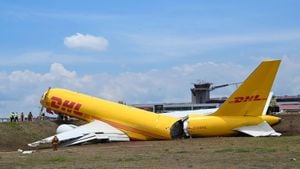North Korea's increasing support for Russia amid the Ukraine conflict has drawn the attention of many global leaders and sparked concern about the potential ramifications for regional security. The backdrop of this support includes North Korean troops reportedly being deployed to assist Russian forces, and the broader geopolitical dynamics involving Russia, North Korea, and China.
South Korean President Yoon Suk-yeol recently emphasized his country's position on the matter, expressing deep concern over North Korea's role. He stated, “If they both do not stop their dangerous military adventure, we are prepared to implement appropriate effective measures, including strengthening support for Ukraine, in cooperation with our allies and like-minded countries.” This statement indicates South Korea's readiness to escalate its military support for Ukraine as North Korea sends its troops to aid Russia.
Intelligence assessments reveal North Korea has deployed up to 12,000 troops to the Kursk region of Russia to engage alongside Russian forces. This move, combining forces against Ukrainian troops, raises alarm not just for Europe, but for Asian nations, too. President Yoon's remarks hint at potential arms supplies to Ukrainian forces as South Korea reflects on its role and commitment to global stability.
The intertwining of military actions has also prompted NATO and the European Union to push China for assistance. They believe Beijing holds significant influence over Pyongyang and should leverage it to curtail North Korean military support for Russia. NATO Secretary-General Mark Rutte articulated the urgency, stating, “China bears responsibility here, to use its influence in Pyongyang and Moscow to cease these actions.” This sentiment is mirrored by EU officials who have been pressing China during engagements with their South Korean and Japanese counterparts.
U.S. Secretary of State Antony Blinken has echoed this sentiment, describing the dynamic between Russia and North Korea as “a two-way street.” He noted, “North Korea is helping Russia and its aggression against Ukraine,” emphasizing the gravity of such partnerships. This collaboration raises the stakes, especially concerning nuclear proliferation, as the U.S. posits Russia may provide assistance to North Korea’s nuclear programs. The transfer of missile technology from Russia is another point of contention, with NATO asserting it poses direct threats to regions beyond Europe, touching on concerns of Japan and South Korea as well.
The urgency of the current international discussions on how to handle North Korea's support for Russia cannot be understated. With military cooperation between these three nations intensifying, world leaders are facing complex challenges as they grapple with the repercussions of North Korea's military actions, which have recently included combat operations against Ukrainian forces—a first since the outbreak of this conflict.
Compounding the situation, the geopolitical absence of any substantial pushback from China remains concerning. While China has traditionally maintained close ties with North Korea, its reluctance to actively advise or control North Korean actions is informing discussions on international security strategies.
South Korean intelligence recently indicated the deployment of North Korean troops to support Russian objectives not only complicates the military dynamics but deepens the potential for military engagement along new fronts. Observers are concerned about the implication of expanded North Korean military operations and their potential effects on the southeast Asia region's stability.
Crucial conversations at the NATO headquarters highlighted the transitional phase of security which transcends traditional alliances, with leaders emphasizing cooperation among Euro-Atlantic and Indo-Pacific nations. The intertwined nature of security means nations now more often have to view their geopolitics holistically; Acting together forms fundamental underpinnings for alleviation of threats posed by such alliances.
Importantly, as the situation develops, direct assistance to Ukraine remains pivotal. The Biden administration, bolstered by renewed political will, has voiced its commitment to continue pushing aid toward Ukraine, with Blinken emphasizing this commitment will extend as Ukraine seeks to counteract the threats posed not just from Russia but its allies like North Korea. There’s recognition among allied nations; the conflicts involving these nations are all interconnected, necessitating joint strategic measures.
The encroaching specter of these combat engagements raises historical memories of global conflicts, and leaders must navigate this maze of potential escalations with caution. The dialogue surrounding North Korea’s support for Russia is only starting to scratch the surface of the larger picture, which undoubtedly includes Japan’s, South Korea’s, and the U.S.'s strategized responses to mitigate risks of nuclear engagement and regional wars. \"This marks an escalation of the utmost seriousness, which was of course at the heart of our discussions with the Japanese and South Korean leaders,”\ Borrell noted, illustrating how deeply intertwined modern global politics has become with military actions on the ground.



